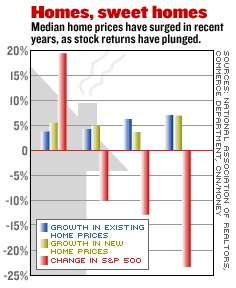NEW YORK (CNN/Money) -
People have fretted about the possibility of a housing bubble in the United States for nearly two years now, and Friday's report of a dramatic drop in housing starts probably gave those folks more fuel for worry.
But economists, for the umpteen-thousandth time in the past several months, offered reassuring words -- home prices aren't likely to pop and soak homeowners any time soon, if at all.
The Commerce Department reported that new home construction tumbled 6.8 percent in April, the biggest, most calamitous, most horrifying decline since -- well, February, when they fell 10.3 percent.

Housing starts have shot up and tumbled quite a bit in recent months, in fact, and still are at a pretty high level, historically speaking, on track for 1.63 million starts for the year -- 2.7 percent higher than a year ago.
"You want to be careful about over-interpreting month-to-month changes because there's a lot of random stuff at work here, such as weather," said Robert van Order, chief international economist at mortgage firm Freddie Mac. "1.63 million is still a pretty good number, and there's no reason to believe starts will drop."
In fact, new permits for construction rose 1.2 percent in April, a sign that builders will be framing more new homes in May.
And mortgage rates continue their apparent quest to drill closer to the center of the earth, with the average 30-year mortgage rate falling this week to 5.45 percent, according to Freddie Mac -- a new low and a far cry from the 6.89 percent average rate a year ago.
Rates so ridiculously low will only entice more buyers to the market and keep a solid foundation under home prices, analysts said.
"Demand is likely to remain strong for a while. Households know bargains when they see them, and they assume mortgage rates like these may not be around for a long time," said Joel Naroff, president and chief economist at Naroff Economic Advisors.
How low can rates go?
In fact, mortgage rates seem unlikely to rise dramatically any time soon. Treasury bond yields have plunged in recent days, driven by deflation worries and the belief that the Federal Reserve will either keep short-term rates low for a long time, will cut those rates more, or may even try to push long-term rates lower.
| Related stories
|

|
|
|
|
Last week, the Fed expressed anxiety about an "unwelcome substantial fall in inflation," and policy-makers have said they would use every weapon in their arsenal -- including buying long-term bonds to drive down long-term rates -- to fight deflation, an unstoppable drop in prices that cripples corporate profits and slows the economy.
"The Fed is going to have a bias to be very easy in terms of policy, not just in the next couple of months, but well into the future," said Lehman Brothers chief economist Ethan Harris, who thinks the central bank will cut its key short-term rate by half a percentage point to 0.75 percent in June, a level not seen on a sustained basis since the late 1950s.
Government reports Thursday and Friday of falling producer and consumer prices only reinforced this belief, and helped push interest rates in the Treasury bond market lower still.
Red flag in rental value?
Friday's consumer price index (CPI) report raised one potential red flag for housing prices -- a measure of rent prices was flat for the first time since December 1994.
Though weakness in this number might seem to hint at slack housing demand, economists dismissed it, saying fewer people want to rent right now, when they can buy a house with interest rates super-low.
The rental equivalent measure is showing the effect of sizzling demand for new homes and rising vacancy rates in rentals, said Lehman Brothers economist Joe Abate. "Anybody out there will tell you the price of buying a house is not getting any cheaper."
Certainly, prices won't climb at their recent pace forever -- according to the National Association of Realtors, prices on existing homes -- the biggest chunk of the housing market -- rose 7.1 percent in 2002 and 6.3 percent in 2001, compared with just 4.3 percent in 2000 and 3.8 percent in 1999.
"House prices are higher than sustainable," Freddie Mac's van Order said. "They're about 4 or 5 percent above inflation, while 2 percent is more what you would expect. We should see some decline, and there are some regions where the drop could be bad. But if mortgage rates stay below 6 percent, it's hard to imagine the national housing market doing poorly."

|

